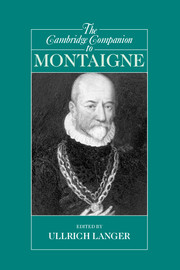Book contents
- Frontmatter
- 1 Introduction
- 2 Montaigne’s political and religious context
- 3 Montaigne’s legacy
- 4 Montaigne and antiquity
- 5 The Essays and the New World
- 6 Justice and the lawlaw: on the reverse side of the Essays
- 7 Montaigne and the notion of prudence
- 8 Montaigne and the truth of the schools
- 9 The investigation of nature
- 10 Montaigne and skepticism
- 11 Montaigne on moral philosophy and the good life
- Bibliography
- Index
8 - Montaigne and the truth of the schools
Published online by Cambridge University Press: 28 May 2006
- Frontmatter
- 1 Introduction
- 2 Montaigne’s political and religious context
- 3 Montaigne’s legacy
- 4 Montaigne and antiquity
- 5 The Essays and the New World
- 6 Justice and the lawlaw: on the reverse side of the Essays
- 7 Montaigne and the notion of prudence
- 8 Montaigne and the truth of the schools
- 9 The investigation of nature
- 10 Montaigne and skepticism
- 11 Montaigne on moral philosophy and the good life
- Bibliography
- Index
Summary
In this chapter I shall address two questions: what did Montaigne have to say about the truth claims and pretensions to knowledge of the philosophy of his day? And how does this relate to his own project in writing the Essays? Truth is, of course, a notoriously difficult term. For some it resides in the relationship of propositions to reality. If there is a correspondence between the two, then the conditions for the proposition being truthful are satisfied; as Montaigne says, “If you say 'it is fine weather' and you are speaking the truth, then it is fine weather.” But you may wish to specify how this correspondence is achieved: in other words, you may wish to associate truth with verifiability, and account for how it comes to be known to be true. Lorraine Daston has pointed out that this version of truth can vary over time, depending on which of several different “epistemological virtues” it is linked to, such as certainty, objectivity, universality, applicability (the “pragmatic” version of truth), or correlation with a whole body of beliefs (what came to be known as the “coherence” theory of truth). Montaigne himself, from his wide reading in ancient writings, touches on all these criteria, and associates them with what he sees as the aim of philosophy, which is to seek truth, knowledge, and certainty;3 he shows himself moreover to be very sensitive to the relationship of authoritative statements and truth, by warning us to dissociate hermeneutic questions (“is this a correct account of what a certain philosopher said?”) from philosophical ones (“how valid is this proposition?”);4 and as a writer about the self, he evinces an understandable preoccupation with truth-telling and sincerity. We can therefore expect his reaction to the philosophy of his day in all these regards to be thoughtful; it is also, as we shall see, relatively well-informed.
- Type
- Chapter
- Information
- The Cambridge Companion to Montaigne , pp. 142 - 162Publisher: Cambridge University PressPrint publication year: 2005
- 3
- Cited by



